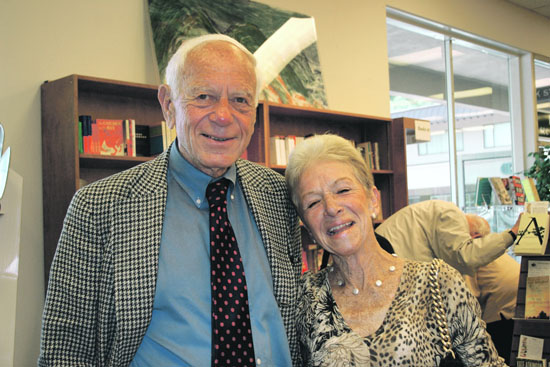 | | | Dr. Walter Bortz and his wife Ruth Anne at Orinda Books. Photo A. Firth
| | | | | | "A hundred years is our birth right," says Walter M. Bortz, M.D., "It all coheres around the idea of living a full life." Bortz, Clinical Associate Professor of Medicine at Stanford University School of Medicine and a nationally recognized expert on aging and longevity, was in Lamorinda last week to share his advice for achieving the centennial marker at presentations at Orinda Books and the Lafayette Library and Learning Center.
 Accompanied by his wife of 57 years, Ruth Anne, Bortz outlined his formula for a long, healthy life, which centers on taking control of one's destiny with a positive attitude, healthy diet, and exercise. Both avid runners, the fit and trim couple clearly practices what he preaches. Now 80 years old, Bortz completed his 40th consecutive Boston Marathon in April, and Ruth Anne, now 79, has also completed the 26-mile run several times and won her age group at age sixty and seventy.
Accompanied by his wife of 57 years, Ruth Anne, Bortz outlined his formula for a long, healthy life, which centers on taking control of one's destiny with a positive attitude, healthy diet, and exercise. Both avid runners, the fit and trim couple clearly practices what he preaches. Now 80 years old, Bortz completed his 40th consecutive Boston Marathon in April, and Ruth Anne, now 79, has also completed the 26-mile run several times and won her age group at age sixty and seventy.
 Bortz reviewed the basic tenets for successful aging outlined in his most recent book, The Road Map to 100, in which he explores the connections between age and disease and debunks misconceptions on how to age. He believes that many of the problems associated with aging, including frailty, heart disease, and memory loss, have less to do with chronology and genes and more to do with a lack of conditioning. A staunch advocate of the essential role of exercise in longevity and good health, Bortz points out that our early ancestors were extremely fit because they spent their days running toward and away from things which is in sharp contrast to the sedentary lifestyles we maintain today. "Maintenance is everything with regard to human health," says Bortz.
Bortz reviewed the basic tenets for successful aging outlined in his most recent book, The Road Map to 100, in which he explores the connections between age and disease and debunks misconceptions on how to age. He believes that many of the problems associated with aging, including frailty, heart disease, and memory loss, have less to do with chronology and genes and more to do with a lack of conditioning. A staunch advocate of the essential role of exercise in longevity and good health, Bortz points out that our early ancestors were extremely fit because they spent their days running toward and away from things which is in sharp contrast to the sedentary lifestyles we maintain today. "Maintenance is everything with regard to human health," says Bortz.
 Focused on the things individuals can change, Bortz believes social interaction and physical fitness are key elements to staying healthy and living longer. "As one ages it is essential to be engaged. It is important to feel necessary," says Bortz, but he acknowledges that the power of positive thinking has its limits. "I believe that attitude is profound, but you can not think away a breast cancer." Still he is passionate about personal responsibility with respect to one's health. "Change what you can, accept what you must, but know the difference," he states.
Focused on the things individuals can change, Bortz believes social interaction and physical fitness are key elements to staying healthy and living longer. "As one ages it is essential to be engaged. It is important to feel necessary," says Bortz, but he acknowledges that the power of positive thinking has its limits. "I believe that attitude is profound, but you can not think away a breast cancer." Still he is passionate about personal responsibility with respect to one's health. "Change what you can, accept what you must, but know the difference," he states.
 As a geriatrician, Bortz views his medical career as an extraordinary privilege - to act as the steward for the end of people's lives. On the subject of dying, he is both philosophical and pragmatic. "An ideal death is one with no pain, no tubes, and no loneliness," says Bortz, "We merge with infinite cosmic dust upon death, what remains are the ripples of your life. Like a pebble in a millpond, these ripples are the reverberations of your life on what remains."
As a geriatrician, Bortz views his medical career as an extraordinary privilege - to act as the steward for the end of people's lives. On the subject of dying, he is both philosophical and pragmatic. "An ideal death is one with no pain, no tubes, and no loneliness," says Bortz, "We merge with infinite cosmic dust upon death, what remains are the ripples of your life. Like a pebble in a millpond, these ripples are the reverberations of your life on what remains."

|
